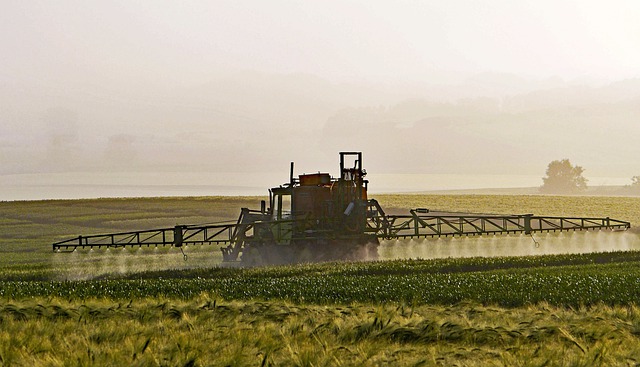This post may contain affiliate links. Please read the disclaimer for more information.
I honestly didn’t believe in eating organic food before.
I thought it was a way for food companies to market certain foods as ‘clean’ in order to charge more money for them. I’ve certainly updated my opinion on that over time.
Organic, when it comes to food, is defined as food grown without the use of synthetic chemicals, such as human-made pesticides and fertilizers, and does not contain genetically modified organisms (GMOs). The key word is synthetic (or human-made), because farmers still have to use natural pesticides and herbicides on organic foods.
This didn’t mean much to me previously. That was until I recently got familiarized with a chemical compound called glyphosate. Glyphosate is the active ingredient in RoundUp (yes, the weed killer you spray on your lawn).
It may be news to you that this same chemical formulation gets sprayed all over a large portion of our food supply in many different countries across the world. Fruit, nuts, and grains seem to get sprayed with it the most with some of the highest scoring crops being almonds, apples, corn, wheat, walnuts, soybeans, rice, grapes, and oranges.
As you can see, it covers the majority of the common food we eat. So why does this matter?
Well according to the EPA, there are “No risks of concern to human health from current uses of glyphosate.” However, the chemical compound has plenty of scrutiny around it.
Big Concerns Around Glyphosate
It has led many countries, mostly in Europe, to make plans to move away from glyphosate altogether.
Austria, Germany, France, Italy, and Russia are just a few of the countries who have made pledges or plans to stop interacting with any glyphosate-containing foods. This includes all kinds of legislation from banning the product altogether to refusing to import certain goods from countries because they know glyphosate was used in the harvesting process.
The reason for much more concern coming about recently is because glyphosate consumption has been linked to many severe health complications like cancer, autism, Parkinson’s disease, Alzheimer’s, among others. These are some pretty heavy claims so let me cite a few sources.
A WHO subcommittee named glyphosate as a carcinogen and afterwards was found by the state of California to cause cancer.
We’ve also seen that General Mills has been hit with a number of lawsuits since these classifications were made. Many of the concerns being around the wording that the food company uses such as “natural ingredients.” Consumers rightfully are wondering what is natural about a synthetic, possibly cancer-causing ingredient in their food.
General Mills was sued over their Nature Valley products containing significant amounts of glyphosate in 2016 and then subsequently dropped their claim of being “natural” after the settlement.
Besides being possibly cancer-causing, glyphosate is a gut microbiome disruptor. It specifically disrupts the shikimate pathway is our gut bacteria, and we know this because that’s the exact pathway it targets when it is used on crops as a desiccant.
This is a huge deal for people because it opens the door for lots of issues. A disrupted gut is the beginning of what could be many different health complications like obesity, Alzheimer’s, autism, ADHD, type 2 diabetes, and many more.
Autism, Parkinson’s, and Alzheimer’s have all become noticeably more common and it is likely no coincidence that glyphosate (RoundUp) has been used on our crops since 1974 and its usage has only increased since then.
How Can We Avoid Glyphosate?
The tough part of this is finding as easy way to avoid glyphosate altogether and the problem is, that is not possible.
What we should aim for is lessening our exposure to it. The reality is, there is residue of it in the food, the water, and even the air.
The number one thing we can do is to eat organic food. This is an obvious choice because farmers are not allowed to spray a synthetic herbicide like RoundUp on organic crops, it must be a natural herbicide. Chris Kresser recommends the same thing on his website:
“When it comes to avoiding glyphosate, it’s simple: eat organic food. Certified organic foods are free of toxic herbicides like glyphosate, have lower pesticide residues, and are richer in micronutrients. Glyphosate urine levels were lower in people who chose mostly organic food versus those who ate conventional.”
The next thing you can do is strategically avoid the crops that score the highest levels of glyphosate residue.
This article does an excellent job of outlining which foods get sprayed with the most glyphosate and how they’re getting harvested with significant residue still remaining. The figures in it are a few years old but it serves as a great guide and is likely still very accurate to today’s farming practices.
The last thing I would recommend is to eat a more carnivorous diet.
What you will notice is that glyphosate can only be sprayed onto crops, not animal foods. And while animals are getting fed plants that were sprayed, we get much less exposure to it when we eat animal foods themselves.
Not to mention, when you buy organic meat, eggs, and so on, their feed is not allowed to have glyphosate in it because of the organic standard. This is some of the thinking I got while listening to Paul Saladino recently, who does the carnivore diet with much success.
These are simply some options you can explore and if one doesn’t suit you, just try another one. I like to practice a little bit of all of these methods.
It’s never been easier to eat clean than with Thrive Market.
Thrive is the #1 online supermarket for natural, organic, and specialty diet foods. With over 1 million members, they make healthy living easy and deliver everything right to your doorstep. Get started today for instant savings and a free gift.


Leave a Reply